- Home
- Thomas Harris
Hannibal Page 3
Hannibal Read online
Page 3
“Thanks. You don’t need to do that. Call me.”
The National Tattler, prime beneficiary of the tabloid boom in the nineties, put out an extra that was extraordinary even by its own standards. Someone threw it at the house at midmorning. Starling found it when she went to investigate the thump. She was expecting the worst, and she got it:
“DEATH ANGEL: CLARICE STARLING, THE FBI’S KILLING MACHINE,” screamed the National Tattler’s headline in seventy-two-point Railroad Gothic. The three front-page photos were: Clarice Starling in fatigues firing a .45-caliber pistol in competition, Evelda Drumgo bent over her baby in the road, her head tilted like that of a Cimabue Madonna, with the brains blown out, and Starling again, putting a brown naked baby on a white cutting board amid knives and fish guts and the head of a shark.
The caption beneath the pictures says, “FBI Special Agent Clarice Starling, slayer of serial killer Jame Gumb, adds at least five notches to her gun. Mother with babe in arms and two police officers among the dead after botched drug raid”’
The main story covered the drug careers of Evelda and Dijon Drumgo, and the appearance of the Crip gang on the war-torn landscape of Washington, D.C. There was a brief mention of fallen officer John Brigham’s military service, and his decorations were cited.
Starling was treated to an entire sidebar, beneath a candid photo of Starling in a restaurant wearing a scoop-necked dress, her face animated.
Clarice Starling, FBI Special Agent, had her fifteen minutes of fame when she shot to death serial murderer Jame Gumb, the “Buffalo Bill” killer, in his basement seven years ago. Now she may face departmental charges and civil liabilities in the death Thursday of a Washington mother accused of manufacturing illegal amphetamines. (See main story Page 1.)
“This may be the end of her career,” said one source at the Bureau of Alcohol, Tobacco and Firearms, the FBI’s sister agency. “We don’t know all the details of how it went down, but John Brigham should be alive today. This is the last thing the FBI needs after Ruby Ridge,” said the source, who declined to be identified.
Clarice Starling’s colorful career began soon after she arrived at the FBI Academy as a trainee. An honors graduate of the University of Virginia in psychology and criminology, she was assigned to interview the lethal madman Dr. Hannibal Lecter, dubbed by this newspaper “Hannibal the Cannibal,” and received information from him that was important in the search for Jame Gumb and the rescue of his hostage, Catherine Martin, daughter of the former U. S. senator from Tennessee.
Agent Starling was the interservice combat pistol champion for three years running before she withdrew from competition. Ironically, Officer Brigham, who died at her side, was firearms instructor at Quantico when Starling trained there and was her coach in competition.
An FBI spokesman said Agent Starling will be relieved of field duties with pay pending the outcome of the FBI’s internal investigation. A hearing is expected later this week before the Office of Professional Responsibility, the FBI’s own dread Inquisition.
Relatives of the late Evelda Drumgo said they will seek civil damages from the U.S. government and from Starling personally in wrongful-death suits.
Drumgo’s three-month-old son, seen in his mother’s arms in the dramatic pictures of the shoot-out, was not injured.
Attorney Telford Higgins, who has defended the Drumgo family in numerous criminal proceedings, alleged that Special Agent Starling’s weapon, a modified Colt .45 semiautomatic pistol, was not approved for use in law enforcement in the city of Washington. “It is a deadly and dangerous instrument not suitable for use in law enforcement,” Higgins said. “Its very use constitutes reckless endangerment of human life,” the noted defense attorney said.
The Tattler had bought Clarice Starling’s very home phone number from one of her informants and rang it until Starling left it off the hook, and used her FBI cell phone to talk to the office.
Starling did not have a great deal of pain in her ear and the swollen side of her face as long as she did not touch the bandage. At least she didn’t throb. Two Tylenol held her. She didn’t need the Percocet the doctor had prescribed. She dozed against the headboard of the bed, the Washington Post sliding off the spread onto the floor, gunpowder residue in her hands, dried tears stiff on her cheeks.
CHAPTER
4
You fall in love with the Bureau, but the Bureau doesn’t fall in love with you.
—MAXIM IN FBI SEPARATION COUNSELING
THE FBI gymnasium in the J. Edgar Hoover Building was almost empty at this early hour. Two middle-aged men ran slow laps on the indoor track. The clank of a weight machine in a far corner and the shouts and impacts of a racquetball game echoed in the big room.
The voices of the runners did not carry. Jack Crawford was running with FBI Director Tunberry at the director’s request. They had gone two miles and were beginning to puff.
“Blaylock at ATF has to twist in the wind for Waco. It won’t happen right now, but he’s done and he knows it,” the director said. “He might as well give the Reverend Moon notice he’s vacating the premises.” The fact that the Bureau of Alcohol, Tobacco and Firearms rents office space in Washington from the Reverend Sun Myung Moon is a source of amusement to the FBI.
“And Farriday is out for Ruby Ridge,” the director continued.
“I can’t see that,” Crawford said. He had served in New York with Farriday in the 1970s when the mob was picketing the FBI field office at Third Avenue and 69th Street. “Farriday’s a good man. He didn’t set the rules of engagement.”
“I told him yesterday morning.”
“He going quietly?” Crawford asked.
“Let’s just say he’s keeping his benefits. Dangerous times, Jack.”
Both men were running with their heads back. Their pace quickened a little. Out of the corner of his eye, Crawford saw the director sizing up his condition.
“You’re what, Jack, fifty-six?”
“That’s right.”
“One more year to mandatory retirement. Lot of guys get out at forty-eight, fifty, while they can still get a job. You never wanted that. You wanted to keep busy after Bella died.”
When Crawford didn’t answer for half a lap, the director saw he had misspoken.
“I don’t mean to be light about it, Jack. Doreen was saying the other day, how much—”
“There’s still some stuff to do at Quantico. We want to streamline VICAP on the Web so any cop can use it, you saw it in the budget.”
“Did you ever want to be director, Jack?”
“I never thought it was my kind of job.”
“It’s not, Jack. You’re not a political guy. You could never have been director. You could never have been an Eisenhower, Jack, or an Omar Bradley.” He motioned for Crawford to stop, and they stood wheezing beside the track. “You could have been a Patton, though, Jack. You can lead ’em through hell and make ’em love you. It’s a gift that I don’t have. I have to drive them.” Tunberry took a quick look around him, picked up his towel off a bench and draped it around his shoulders like the vestment of a hanging judge. His eyes were bright.
Some people have to tap their anger to be tough, Crawford reflected as he watched Tunberry’s mouth move.
“In the matter of the late Mrs. Drumgo with her MAC 10 and her meth lab, shot to death while holding her baby: Judiciary Oversight wants a meat sacrifice. Fresh, bleating meat. And so do the media. DEA has to throw them some meat. ATF has to throw them some meat. And we have to throw them some. But in our case, they just might be satisfied with poultry. Krendler thinks we can give them Clarice Starling and they’ll leave us alone. I agree with him. ATF and DEA take the rap for planning the raid. Starling pulled the trigger.”
“On a cop killer who shot her first.”
“It’s the pictures, Jack. You don’t get it, do you? The public didn’t see Evelda Drumgo shoot John Brigham. They didn’t see Evelda shoot at Starling first. You don’t see it if you don’t know
what you’re looking at. Two hundred million people, a tenth of whom vote, saw Evelda Drumgo sitting in the road in a protective posture over her baby, with her brains blown out. Don’t say it, Jack—I know you thought for a while Starling would be your protégée. But she’s got a smart mouth, Jack, and she got off to the wrong start with certain people—”
“Krendler is a pissant.”
“Listen to me and don’t say anything until I finish. Starling’s career was flat-lining anyway. She’ll get an administrative discharge without prejudice, the paperwork won’t look any worse than a time-and-attendance rap— she’ll be able to get a job. Jack, you’ve done a great thing in the FBI, the Behavioral Science. A lot of people think if you’d pushed your own interests a little better you’d be a lot more than a section chief, that you deserve a lot more. I’ll be the first one to say it. Jack, you’re going to retire a deputy director. You have that from me.”
“You mean if I stay out of this?”
“In the normal course of events, Jack. With peace all over the kingdom, that’s what will happen. Jack, look at me.”
“Yes, Director Tunberry?”
“I’m not asking you, I’m giving you a direct order. Stay out of this. Don’t throw it away, Jack. Sometimes you’ve just got to turn your face away. I’ve done it. Listen, I know it’s hard, believe me I know how you feel.”
“How I feel? I feel like I need a shower,” Crawford said.
CHAPTER
5
STARLING WAS an efficient housekeeper, but not a meticulous one. Her side of the duplex was clean and she could find everything, but stuff tended to pile up—clean unsorted laundry, more magazines than places to put them. She was a world-class last-minute ironer and she didn’t need to primp, so she got by.
When she wanted order, she went through the shared kitchen to Ardelia Mapp’s side of the duplex. If Ardelia was there, she had the benefit of her counsel, which was always useful, though sometimes closer to the bone than she might wish. If Ardelia was not there, it was understood that Starling could sit in the absolute order of Mapp’s dwelling to think, as long as she didn’t leave anything. There she sat today. It is one of those residences that always contains its occupant whether she’s there or not.
Starling sat looking at Mapp’s grandmother’s life insurance policy, hanging on the wall in a handmade frame, just as it had hung in the grandmother’s farm tenant house and in the Mapps’ project apartment during Ardelia’s childhood. Her grandmother had sold garden vegetables and flowers and saved the dimes to pay the premiums, and she had been able to borrow against the paid-up policy to help Ardelia over the last hump when she was working her way through college. There was a picture, too, of the tiny old woman, making no attempt to smile above her starched white collar, ancient knowlege shining in the black eyes beneath the rim of her straw boater.
Ardelia felt her background, found strength in it every day. Now Starling felt for hers, tried to gather herself. The Lutheran Home at Bozeman had fed and clothed her and given her a decent model of behavior, but for what she needed now, she must consult her blood.
What do you have when you come from a poor-white background? And from a place where Reconstruction didn’t end until the 1950s. If you came from people often referred to on campuses as crackers and rednecks or, condescendingly, as blue-collar or poor-white Appalachians. If even the uncertain gentility of the South, who accord physical work no dignity at all, refer to your people as peckerwoods—in what tradition do you find an example? That we whaled the piss out of them that first time at Bull Run? That Great-granddaddy did right at Vicksburg, that a corner of Shiloh is forever Yazoo City?
There is much honor and more sense in having succeeded with what was left, making something with the damned forty acres and a muddy mule, but you have to be able to see that. No one will tell you.
Starling had succeeded in FBI training because she had nothing to fall back on. She survived most of her life in institutions, by respecting them and playing hard and well by the rules. She had always advanced, won the scholarship, made the team. Her failure to advance in the FBI after a brilliant start was a new and awful experience for her. She batted against the glass ceiling like a bee in a bottle.
She had had four days to grieve for John Brigham, shot dead before her eyes. A long time ago John Brigham had asked her something and she said no. And then he asked her if they could be friends, and meant it, and she said yes, and meant it.
She had to come to terms with the fact that she herself had killed five people at the Feliciana Fish Market. She flashed again and again on the Crip with his chest crushed between the cars, clawing at the car top as his gun slid away.
Once, for relief, she went to the hospital to look at Evelda’s baby. Evelda’s mother was there, holding her grandchild, preparing to take him home. She recognized Starling from the newspapers, handed the baby to the nurse and, before Starling realized what she was about, she slapped Starling’s face hard on the bandaged side.
Starling didn’t strike back, but pinned the older woman against the maternity ward window in a wrist-lock until she stopped struggling, her face distorted against the foam and spit-smeared glass. Blood ran down Starling’s neck and the pain made her dizzy. She had her ear restitched in the emergency room, and declined to file charges. An emergency room aide tipped the Tattler and got three hundred dollars.
She had to go out twice more—to make John Brigham’s final arrangements and to attend his funeral at Arlington National Cemetery. Brigham’s relatives were few and distant and in his written final requests, he named Starling to take care of him.
The extent of his facial injuries required a closed casket, but she had seen to his appearance as well as she could. She laid him out in his perfect Marine dress blues, with his Silver Star and ribbons for his other decorations.
After the ceremony, Brigham’s commanding officer delivered to Starling a box containing John Brigham’s personal weapons, his badges, and some items from his ever-cluttered desk, including his silly weather bird that drank from a glass.
In five days Starling faced a hearing that could ruin her. Except for one message from Jack Crawford, her work phone had been silent, and there was no Brigham to talk to anymore.
She called her representative in the FBI Agent’s Association. His advice was to not wear dangly earrings or open-toed shoes to the hearing.
Every day television and the newspapers seized the story of Evelda Drumgo’s death and shook it like a rat.
Here in the absolute order of Mapp’s house, Starling tried to think.
The worm that destroys you is the temptation to agree with your critics, to get their approval.
A noise was intruding.
Starling tried to remember her exact words in the undercover van. Had she said more than was necessary? A noise was intruding.
Brigham told her to brief the others on Evelda. Did she express some hostility, say some slur—
A noise was intruding.
She came to herself and realized she was hearing her doorbell next door. A reporter probably. She was also expecting a civil subpoena. She moved Mapp’s front curtain and peeked out to see the mailman returning to his truck. She opened Mapp’s front door and caught him, turning her back to the press car across the street with the telephoto lens as she signed for the express mail. The envelope was mauve, with silky threads in the fine linen paper. Distracted as she was, it reminded her of something. Back inside, out of the glare, she looked at the address. A fine copperplate hand.
Above the constant droning note of dread in Starling’s mind, a warning went off. She felt the skin on her belly quiver as though she had dripped something cold down her front.
Starling took the envelope by the corners and carried it into the kitchen. From her purse, she took the ever-present white evidence-handling gloves. She pressed the envelope on the hard surface of the kitchen table and felt it carefully all over. Though the paper stock was heavy, she would have detected the lu
mp of a watch battery ready to fire a sheet of C-4. She knew she should take it to a fluoroscope. If she opened it she might get in trouble. Trouble. Right. Balls.
She slit the envelope with a kitchen knife and took out the single, silky sheet of paper. She knew at once, before she glanced at the signature, who had written to her.
Dear Clarice,
I have followed with enthusiasm the course of your disgrace and public shaming. My own never bothered me, except for the inconvenience of being incarcerated, but you may lack perspective.
In our discussions down in the dungeon, it was apparent to me that your father, the dead night watchman, figures large in your value system. I think your success in putting an end to Jame Gumb’s career as a couturier pleased you most because you could imagine your father doing it.
Now you are in bad odour with the FBI. Have you always imagined your father ahead of you there, have you imagined him a section chief or—better even than Jack Crawford—a DEPUTY DIRECTOR, watching your progress with pride? And now do you see him shamed and crushed by your disgrace? Your failure? The sorry, petty end of a promising career? Do you see yourself doing the menial tasks your mother was reduced to, after the addicts busted a cap on your DADDY? Hmmmm? Will your failure reflect on them, will people forever wrongly believe that your parents were trailer camp tornado bait white trash? Tell me truly, Special Agent Starling.
Give it a moment before we proceed.

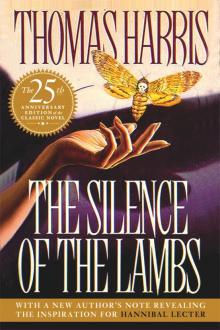 The Silence of the Lambs
The Silence of the Lambs Red Dragon
Red Dragon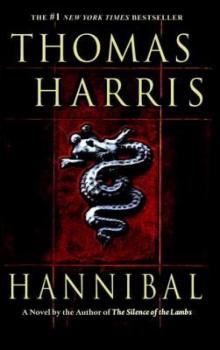 Hannibal
Hannibal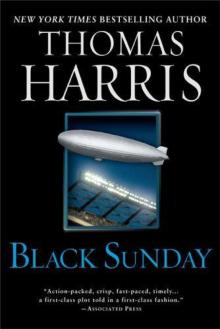 Black Sunday
Black Sunday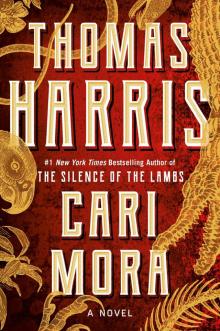 Cari Mora
Cari Mora Hannibal Rising
Hannibal Rising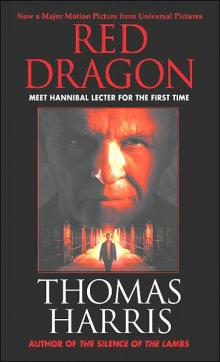 Red Dragon hl-1
Red Dragon hl-1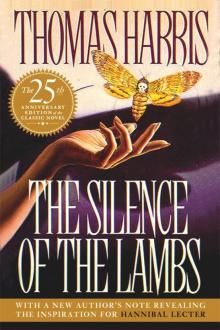 The Silence of the Lambs (Hannibal Lecter)
The Silence of the Lambs (Hannibal Lecter)